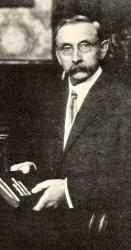Planning worship?
Check out our sister site, ZeteoSearch.org,
for 20+ additional resources related to your search.
- |
User Links
Search Results
That solemn hour will come for me
Appears in 8 hymnals Scripture: Psalm 23:4 Used With Tune: URBANA
That solemn hour will come for me
That solemn hour will come for me
Hymnal: Deutsches Lieder- und Melodienbuch #a354 (1895) Languages: English
That solemn hour will come for me
That solemn hour will come for me
Hymnal: The Sabbath Hymn and Tune Book #321b (1859)
That solemn hour will come for me
That solemn hour will come for me
Hymnal: Hymns and Tunes #354 (1890) Scripture: Psalm 23:4 Languages: English Tune Title: URBANA
That solemn hour will come for me
Anonymous
Person Name: Unknown Author of "That solemn hour will come for me" in Hymnal of the Methodist Episcopal Church In some hymnals, the editors noted that a hymn's author is unknown to them, and so this artificial "person" entry is used to reflect that fact. Obviously, the hymns attributed to "Author Unknown" "Unknown" or "Anonymous" could have been written by many people over a span of many centuries.
Anonymous
Jacob Henry Hall

1855 - 1941 Person Name: J. H. Hall Composer of "URBANA" in Hymns and Tunes Jacob Henry Hall, 1855-1941
Born: January 2, 1855, near Harrisonburg, Virginia.
Died: December 22, 1941.
Buried: Dayton, Virginia.
Son of farmer George G. Hall and Elizabeth Thomas Hall, Jacob attended singing schools taught by Timothy Funk when he was a boy. As his love of music progressed, he earned money by trapping quail and bought a German accordion; he soon learned to play one part while singing another. After he and his brother jointly purchased an organ, he taught himself to play hymn tunes, Gospel songs, and anthems. He went on to study music theory, harmony, and composition in Harrisonburg and elsewhere, and in 1877 attended a Normal Music School in New Market, Virginia, taught by Benjamin Unseld and P. J. Merges. Afterward, he partnered with H. T. Wartman for two years to conduct singing schools and conventions. In 1890, Hall attended Dana’s Musical Institute in Warren, Ohio, and a normal school run by George & F. W. Root at Silver Lake, New York. He later served as principal of the National Normal School of Music.
Hall’s works include:
Hall’s Songs of Home, 1885
The Star of Bethlehem (Dayton, Virginia: Ruebush-Kieffer Company)
Musical Million (assistant editor)
Spirit of Praise, with William Kirkpatrick & Charles Case (Dayton, Virginia: The Ruebush-Kieffer Company, 1911)
Hall’s Quartettes for Men, 1912
Biography of Gospel Song and Hymn Writers/em> (New York: Fleming H. Revell Company, 1914)
Sources--
Hall, pp. 329-34
Lyrics--
Glorious Morning Dawns, The
O Thou Whose Matchless Power Controls
--hymntime.com/tch
Jacob Henry Hall


 My Starred Hymns
My Starred Hymns


